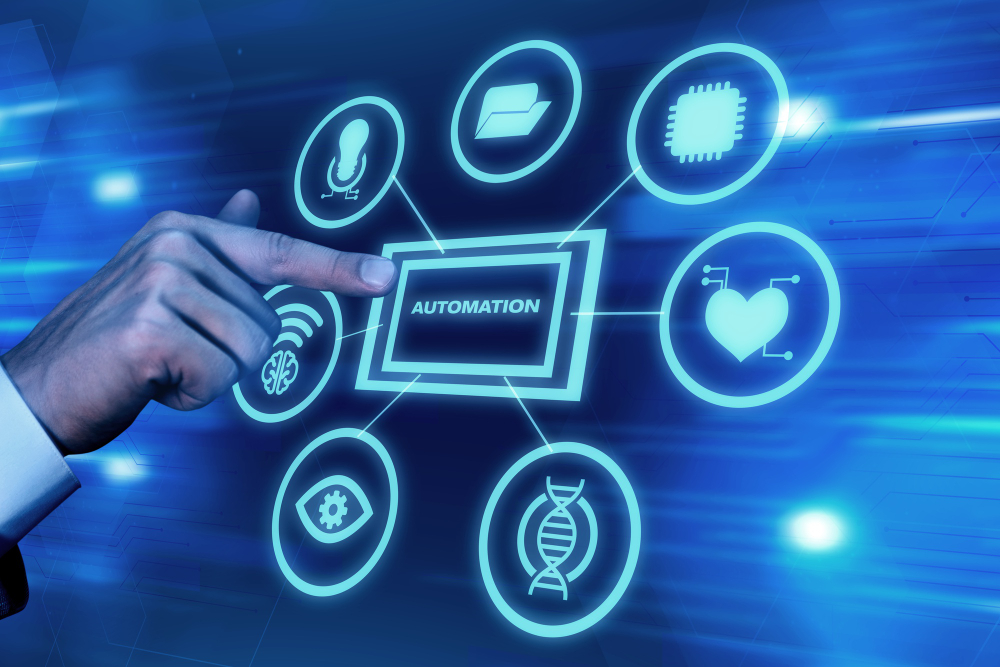A Simple Guide to AI Automation for Modern Businesses
AI automation is quickly becoming one of the most important technologies in today’s business world. Companies of all sizes startups, SMEs, and enterprises are adopting AI tools to speed up processes, reduce costs, and improve efficiency. But while AI automation sounds complex, the reality is that it can be understood and implemented in a simple, practical way.
In this guide, we’ll break down what AI automation is, how it works, why it matters, and how businesses can start using it today. Whether you’re a business owner, manager, or digital transformation leader, this article will help you understand AI automation in an easy and clear way.
What Is AI Automation?
AI automation is the use of artificial intelligence to perform tasks, make decisions, and run processes without constant human input. It combines automation with intelligent technologies like machine learning, natural language processing, and data analytics.
In simple words, AI automation helps your business run faster, smarter, and automatically.
Examples of AI automation:
- AI chatbots answering customer questions
- Automatic invoice processing
- AI tools that analyze business data
- Automated email responses
- Workflow automation powered by machine learning
- Predictive tools that help teams make faster decisions
From small repetitive tasks to complex workflows, AI automation can handle almost anything.
Why AI Automation Matters for Every Business
AI automation has become essential not optional. As competition increases and customers expect better service, businesses need smarter ways to work. AI automation delivers exactly that.
Here are the biggest reasons why it matters:
1. It Saves Time
AI automation takes over repetitive tasks like data entry, reporting, scheduling, email sorting, and customer queries. This gives employees more time to focus on important tasks.
2. It Reduces Errors
Human mistakes are common in manual processes. AI tools help eliminate errors and keep processes consistent.
3. It Improves Customer Experience
AI chatbots, automated helpdesks, and personalized recommendations provide fast and accurate responses 24/7.
4. It Lowers Costs
When tasks happen automatically, businesses need fewer manual operations saving money on resources, labor, and inefficiencies.
5. It Helps Teams Work Smarter
AI doesn’t replace humans; it enhances their abilities. Employees can use AI insights to make better decisions.
How AI Automation Works
AI automation works by combining three key components:
1. Artificial Intelligence
AI “learns” from data and improves over time. It understands patterns, predicts outcomes, and helps automate smart decisions.
2. Automation
This includes tools and systems that execute tasks automatically based on preset rules or triggers.
3. Data
Data is the backbone of AI automation. The more accurate data an AI system has, the smarter it becomes.
Together, these elements create a powerful automation system capable of handling both simple and complex business operations.
Popular Areas Where Businesses Use AI Automation
AI automation can be implemented across almost every department. Here are the most common areas:
1. Customer Support Automation
AI chatbots, virtual assistants, automated ticketing systems, and self-service portals help businesses respond faster and more efficiently.
2. Sales Automation
AI can identify potential leads, score them, generate proposals, and even send follow-up emails automatically.
3. Marketing Automation
AI helps with content scheduling, social media automation, email campaigns, predictive analytics, and customer segmentation.
4. HR and Recruitment
AI development company can screen resumes, schedule interviews, analyze candidate profiles, and automate onboarding tasks.
5. Finance Automation
Automatic invoice processing, fraud detection, expense tracking, and financial forecasting become easier through AI.
6. Operations and Workflow Management
AI workflow automation tools streamline complex business processes and ensure smooth team coordination.
Top Benefits of AI Automation
Here’s a closer look at why so many companies are investing in AI automation:
Faster Business Processes
AI speeds up tasks that would take humans hours to complete.
Higher Productivity
Employees can focus on growth strategies instead of repetitive work.
Improved Decision-Making
AI analyzes large volumes of data and provides real-time insights.
Better Compliance and Accuracy
AI-driven systems follow rules, maintain logs, and reduce the risk of compliance errors.
Scalability
As your business grows, AI automation grows with you without needing extra manpower.
Real-World Examples of AI Automation Tools
Here are some commonly used AI automation tools in 2025:
- Zapier with AI features
- Make.com (advanced workflows)
- Microsoft Power Automate
- UIPath (robotic process automation)
- Notion AI
- Jasper AI
- HubSpot automation
- Salesforce Einstein
- ChatGPT for business workflows
- Custom AI solutions by automation agencies
These tools help businesses automate everything from communication to analytics to workflows.
How to Start Using AI Automation in Your Business
Adopting AI may feel overwhelming, but following a step-by-step approach makes it easy.
Identify Manual Tasks
Look for tasks that are repetitive, time-consuming, or error-prone.
Choose the Right AI Tools
Pick automation tools that fit your business size, goals, and workflows.
Start Small
Begin with simple automation like:
- AI emails
- Automated reports
- Chatbots
- Workflow triggers
Then expand gradually.
Train Your Team
Employees need to understand how to use AI tools effectively.
Monitor and Improve
Evaluate performance regularly and optimize your automation strategy.
Future of AI Automation
The future of business automation is becoming more intelligent, personalized, and integrated. Upcoming trends include:
AI-driven decision-making
AI will help businesses make faster, more accurate decisions using predictive models.
Full workflow automation
From onboarding to invoicing, workflows will run entirely on AI-powered systems.
Conversational AI everywhere
Voice-based assistants and smart chatbots will become standard.
Hyper-automation
Multiple technologies (AI, RPA, ML, analytics) will work together to automate everything possible.
AI automation will play a major role in helping companies become more efficient and competitive.
Conclusion
AI automation is no longer a technology of the future it’s a practical tool businesses can use today. It helps reduce workload, improve accuracy, speed up operations, and offer better customer experiences.
Whether you run a small business or a large enterprise, adopting AI automation can transform the way you work. Start small, choose the right tools, and gradually build an intelligent workflow that helps your business grow faster and smarter.













